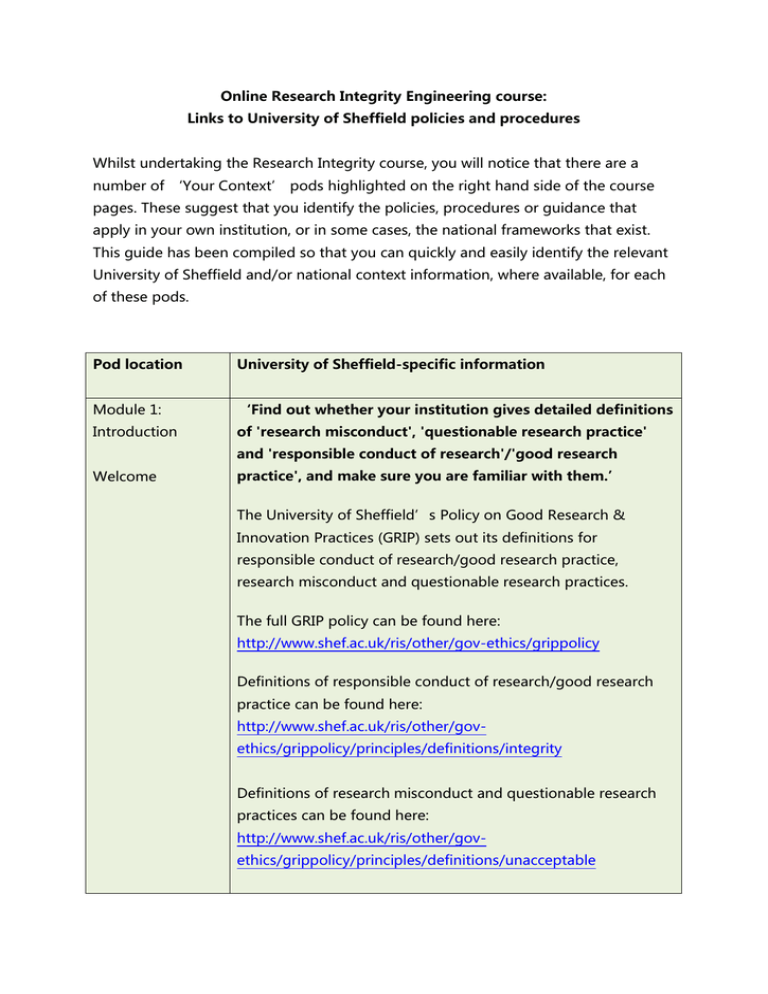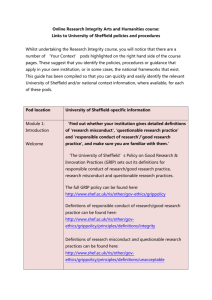Online Research Integrity Engineering course:
advertisement

Online Research Integrity Engineering course: Links to University of Sheffield policies and procedures Whilst undertaking the Research Integrity course, you will notice that there are a number of ‘Your Context’ pods highlighted on the right hand side of the course pages. These suggest that you identify the policies, procedures or guidance that apply in your own institution, or in some cases, the national frameworks that exist. This guide has been compiled so that you can quickly and easily identify the relevant University of Sheffield and/or national context information, where available, for each of these pods. Pod location University of Sheffield-specific information Module 1: ‘Find out whether your institution gives detailed definitions Introduction of 'research misconduct', 'questionable research practice' and 'responsible conduct of research'/'good research Welcome practice', and make sure you are familiar with them.’ The University of Sheffield’s Policy on Good Research & Innovation Practices (GRIP) sets out its definitions for responsible conduct of research/good research practice, research misconduct and questionable research practices. The full GRIP policy can be found here: http://www.shef.ac.uk/ris/other/gov-ethics/grippolicy Definitions of responsible conduct of research/good research practice can be found here: http://www.shef.ac.uk/ris/other/govethics/grippolicy/principles/definitions/integrity Definitions of research misconduct and questionable research practices can be found here: http://www.shef.ac.uk/ris/other/govethics/grippolicy/principles/definitions/unacceptable and here: http://www.shef.ac.uk/ris/other/govethics/grippolicy/annex/unacceptable Module 1: ‘Do you know your institution's guidelines and policies for Introduction responsible research? Find them and familiarise yourself with them.’ Principles and responsibilities The University of Sheffield’s key policies for responsible research are as follows: Policy on Good Research & Innovation Practices: http://www.shef.ac.uk/ris/other/gov-ethics/grippolicy Ethics Policy Governing Research Involving Human Participants, Personal Data and Human Tissue: http://www.shef.ac.uk/ris/other/gov-ethics/ethicspolicy A list of further complementary policies can be found here: http://www.shef.ac.uk/ris/other/govethics/grippolicy/annex/complementary Key national frameworks for research integrity include: The Concordat to Support Research Integrity: http://www.universitiesuk.ac.uk/highereducation/Pages/Thecon cordattosupportresearchintegrity.aspx The Research Councils UK Policy and Guidelines on the Governance of Good Research Conduct: http://www.rcuk.ac.uk/Publications/researchers/Pages/grc.aspx The UK Research Integrity Office’s Code of Practice for Research: http://www.ukrio.org/ukR10htre/UKRIO-Code-of-Practice-forResearch1.pdf Module 1: ‘Locate and familiarise yourself with your institution's Introduction misconduct and whistleblowing policies, and any national frameworks or policies on misconduct. Find out, too, who Responding to your institution's research integrity officer or other named research person responsible for handling cases of research misconduct (Pod misconduct is.’ 1) Researchers at the University of Sheffield who come across suspected research misconduct have a duty to immediately raise this with an appropriate authority – their supervisor, PGR tutor, principal investigator, director of research or head of department. Whistleblowers will be treated confidentially, fairly and supportively. Honest errors or mistakes should be disclosed by researchers transparently and quickly, and in such cases the remedy is likely to be supportive and constructive. In contrast deliberate, dangerous, negligent or corrupt deviations from accepted practices will be managed in accordance with the appropriate misconduct policy. Information about the University of Sheffield’s policies relating to research misconduct can be found here: http://www.shef.ac.uk/ris/other/govethics/grippolicy/principles/definitions/misconduct The University’s Policy on Investigating and Responding to Allegations of Research Misconduct can be found here: http://www.shef.ac.uk/hr/guidance/academicstaff/researchmisc onduct The University’s Student Discipline Regulations and the Complaints Procedure can be found here: http://www.shef.ac.uk/ssd/sca/index The University’s Public Interest Disclosure (Whistleblowing) Policy can be found here: http://www.shef.ac.uk/hr/az/publicinterest Module 1: ‘You can find updates on research integrity matters from Introduction the websites of your national funding agencies or bodies dealing with research integrity.’ Responding to research misconduct (Pod 2) These may include the following: UK Research Integrity Office: http://www.ukrio.org/ Research Councils UK: http://www.rcuk.ac.uk/pages/home.aspx Module 1: ‘Some institutions or departments may run mentoring Introduction schemes as part of the training and development of postgraduate students. Find out whether yours is one of Research training and professionalism them.’ The University of Sheffield runs a compulsory module for all research students on research integrity and ethics, within the Doctoral Development Programme. Further details can be found here: http://www.shef.ac.uk/ris/pgr/ddpportal/reit The University runs a mentoring scheme for research staff. Details can be found here: http://www.sheffield.ac.uk/ris/ecr/mentoring Module 2: ‘Check online and consult with your supervisor to find out Designing what defines 'research' and 'human participant' in your particular context.’ Research with human participants: Definitions ‘Research’ and ‘human participant’ are defined in the ‘General Principles and Statements’ section of the University of Sheffield’s Ethics Policy Governing Research Involving Human Participants, Personal Data and Human Tissue: http://www.shef.ac.uk/ris/other/govethics/ethicspolicy/general-principles Module 2: ‘Do you know where to find your national (if any), Designing institutional and subject-related guidelines about CoI policies? All institutions, for example, have a policy on IP. Do Financial interests and intellectual property you know what yours is?’ Information about the University of Sheffield’s conflict of interest policy can be found here: http://www.sheffield.ac.uk/hr/az/conflictofinterest Information about the University’s policies on patents and intellectual property can be found here: http://www.shef.ac.uk/hr/az/patent The University’s financial regulations can be found here: http://www.shef.ac.uk/finance/regulations Module 2: ‘Do you know your institution's guidelines and policies for Designing responsible workplace safety? Find them and familiarise yourself with them.’ Workplace and environmental Information about the University of Sheffield’s policies and safety guidelines for responsible workplace safety can be found here: Module 3: ‘Find out any local, institutional or subject-specific policies Conducting regarding research record maintenance.’ Research record The University of Sheffield’s Policy on Good Research & http://www.shef.ac.uk/hs Innovation Practices includes guidance on good practices in managing research data, and a specific policy on research data management, which can be found here: http://www.shef.ac.uk/ris/other/govethics/grippolicy/practices/all/rdm Module 3: ‘In addition to the national regulations given in the 'Useful Conducting advice' box, many institutions also impose their own requirements for data storage. Find out how long your Research data and material institution expects you to store your research data.’ The University of Sheffield’s Policy on Good Research & Innovation Practices includes guidance on good practices in managing research data and a specific Data Management Policy, which can be found here: http://www.shef.ac.uk/ris/other/govethics/grippolicy/practices/all/rdm Module 3: Conducting Research data and material ‘Find out what the data sharing and security policies are in your particular institution and department. Take a look at your own institution's website and locate any appropriate information.’ The University of Sheffield’s Data Management Policy, including information about data sharing and security, can be found here: http://www.shef.ac.uk/ris/other/govethics/grippolicy/practices/all/rdm Further information can also be found in the University Library’s ‘Information for Researchers’ webpages: http://www.shef.ac.uk/library/services/researchers Module 4: ‘Find out and familiarise yourself with your institution's Reporting policy on plagiarism.’ Plagiarism The University of Sheffield’s Policy on Good Research & Innovation Practices includes clarification of the University’s position on what is meant by unacceptable research practices (such as plagiarism): http://www.shef.ac.uk/ris/other/govethics/grippolicy/annex/unacceptable Information for postgraduate research students about plagiarism can also be found in the Code of Practice for Research Degree Programmes: http://www.shef.ac.uk/ris/pgr/code/plagiarism Module 4: ‘Find and familiarise yourself with your institution's policies Reporting on authorship.’ Authorship The University of Sheffield’s Policy on Good Research & Innovation Practices includes good practices in authorship and acknowledgement: http://www.shef.ac.uk/ris/other/govethics/grippolicy/practices/all/authorship Module 5: ‘Some institutions provide policies and advice on what type Responsibilities to of issue researchers may advocate for. Find out whether society yours is one of them. In addition, if you are called upon as an expert witness in a court case, your institution should be Advocacy able to provide you with guidance on this.’ The University of Sheffield’s Policy on Good Research & Innovation Practices includes good practices in public engagement and demonstrating public benefit (encompassing advocacy): http://www.shef.ac.uk/ris/other/govethics/grippolicy/practices/all/publicengage Module 5: ‘Find out the rules and regulations that operate in your Responsibilities to particular geographical regions and subject discipline.’ society Responsibility to society The University of Sheffield has decided not to permit any research that is funded by tobacco companies. Other rules and regulations may operate in your particular subject discipline


